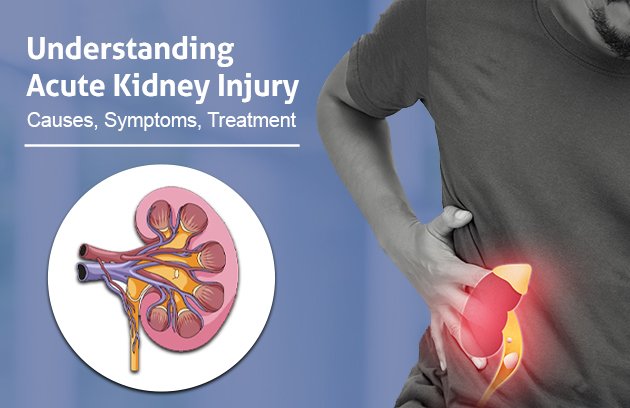What is Acute Kidney Injury?
Acute kidney injury (AKI), also known as acute renal failure, is a sudden episode where the kidneys fail to filter waste from the blood adequately. This can lead to dangerous levels of waste in the body and disrupt the chemical balance of the blood, affecting other organs. AKI typically develops within a few days and is particularly common in critically ill patients who are in intensive care.
Causes of Acute Kidney Injury
Acute kidney injury (AKI) is a serious condition where the kidneys suddenly stop functioning properly. It can occur due to various factors affecting the kidneys differently. Understanding these causes is crucial for preventing and managing AKI effectively. Here’s a detailed look at the causes, categorized into three primary groups:
Prerenal Causes
Prerenal causes of AKI are factors that affect the blood flow before it reaches the kidneys. These causes do not initially damage the kidney tissue directly but impair kidney function by affecting the blood supply:
- Blood Loss: Significant loss of blood from injuries, surgeries, or bleeding disorders can decrease blood volume, reducing the blood flow to the kidneys.
- Dehydration: Severe dehydration from not drinking enough fluids, prolonged vomiting, diarrhoea, or excessive sweating can lead to insufficient blood flow to the kidneys.
- Heart Dysfunction: Heart failure and other conditions that impair the heart’s ability to pump blood effectively can decrease the amount of blood flowing to the kidneys, leading to renal hypoperfusion (insufficient blood supply).
Intrinsic Causes
Intrinsic causes involve direct damage to the kidneys themselves, affecting the kidney structures that filter blood and produce urine:
- Acute Tubular Necrosis (ATN): This is the most common cause of intrinsic AKI. ATN occurs due to damage to the kidney’s tubule cells, which can result from toxins (like certain medications or heavy metals), severe infections (like sepsis), or ischemia (prolonged lack of oxygen).
- Glomerulonephritis: This refers to inflammation of the glomeruli, the tiny structures within the kidneys responsible for blood filtration. Autoimmune diseases, infections, or vasculitis can trigger it.
- Acute Interstitial Nephritis: An allergic reaction to certain drugs, infections, or autoimmune diseases can cause inflammation of the kidney’s interstitial tissues, leading to impaired kidney function.
Postrenal Causes
Postrenal causes of AKI are related to obstructions in the urinary tract that prevent the flow of urine out of the kidneys. These obstructions can lead to back pressure and damage to the kidneys:
- Urinary Tract Obstructions: Blockages in the urinary tract, such as kidney stones, tumours, or enlarged prostate gland, can prevent urine from flowing naturally. This can increase pressure back up into the kidneys, causing damage and reduced function.
- Neurogenic Bladder: Dysfunctions of the nervous system that control bladder emptying can lead to incomplete bladder emptying or bladder overdistention, resulting in back pressure and kidney damage.
- Ureteral Obstruction: This can be caused by scarring or external compression of the ureters, the tubes that transport urine from the kidneys to the bladder.
Symptoms of Acute Renal Failure
Recognizing the symptoms of acute kidney injury is critical for timely treatment. Common symptoms include:
- Nausea and Fluid Retention: Swelling in the legs, feet, or ankles due to fluid accumulation.
- Reduced Urine Output: Noticing significantly less urine than usual.
- Breathing Difficulties: Caused by fluid retention in the lungs.
- Irregular Heartbeat and Chest Pain: Due to imbalances in potassium or other minerals.
- Confusion or Decreased Alertness: Resulting from the build-up of waste products in the blood.
Diagnosing Acute Kidney Injury
Diagnosing AKI involves several tests to understand the extent of kidney damage and its causes:
- Blood Tests: Check for creatinine, urea, and other waste product levels.
- Urine Tests: Analyze abnormalities that indicate kidney issues.
- Imaging Tests: Ultrasounds or CT scans to look for blockages or structural problems.
- Kidney Biopsy: Occasionally needed to assess the extent of kidney tissue damage.
Treatment for Acute Kidney Injury
Treatment of AKI focuses on addressing the initial cause of the injury and supporting kidney function:
- Managing Fluid Levels: IV fluids might be administered if dehydration is a factor; diuretics are used if there is fluid overload.
- Medications: To manage symptoms like high potassium or low calcium.
- Dialysis: Temporary dialysis may be necessary to help remove toxins and excess fluids from the blood, allowing the kidneys to recover.
Differences Between Acute and Chronic Kidney Disease
It’s vital to understand the differences between acute kidney injury and chronic kidney disease (CKD):
- Onset: AKI occurs suddenly and can often be reversible if treated promptly, whereas CKD develops slowly over many years and is generally irreversible.
- Causes: AKI can be due to sudden incidents like accidents or acute illnesses, while CKD is often caused by long-term diseases such as diabetes or high blood pressure.
- Treatment: The treatment of AKI aims at a complete recovery, while CKD management focuses on slowing disease progression and managing symptoms.
Acute Kidney Injury Prevention
Preventing AKI involves managing risk factors and maintaining overall kidney health:
- Hydration: Ensuring adequate fluid intake, especially during illnesses or in hot weather.
- Avoiding Nephrotoxic Substances: Being cautious with medications that can harm the kidneys and avoiding exposure to certain toxins.
- Regular Check-ups: Especially important for those with risk factors for kidney disease or those taking medications that affect kidney function.
Conclusion
In conclusion, understanding the diverse causes of acute kidney injury—from prerenal factors like dehydration to intrinsic damage from infections, and postrenal obstructions like kidney stones—is crucial for effective prevention and management. Addressing these underlying issues swiftly can help mitigate the risks associated with AKI and improve patient outcomes. For those seeking expert guidance or facing symptoms suggestive of acute kidney injury, consulting with a specialized Urology Specialist like Dr. Saket Narnoli is highly recommended. Dr. Narnoli’s expertise can provide critical support in diagnosing and treating this complex condition, ensuring the best possible care for maintaining kidney health.


